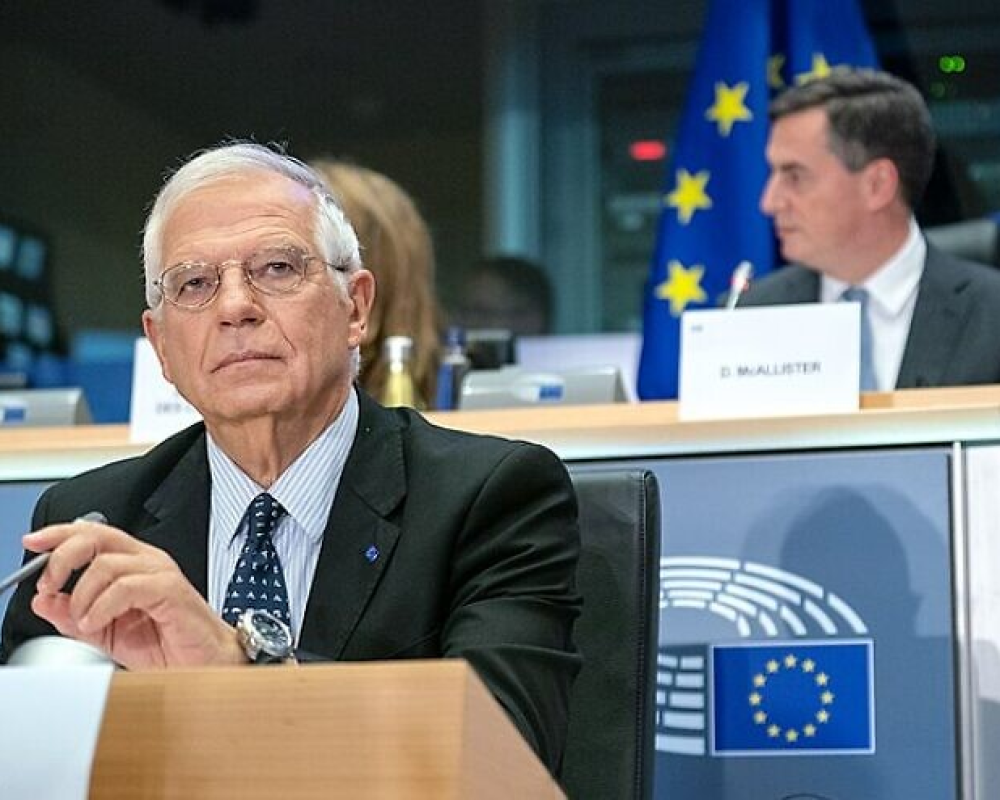
Strasbourg,/ PNN /
In a plenary session held at the European Parliament, High Representative/Vice-President Josep Borrell delivered a speech on the European Union's relations with the Palestinian Authority. Commissioner for International Partnerships, Jutta Urpilainen, presented the speech on behalf of High Representative/Vice-President Josep Borrell. Here are the key points from the speech:
Addressing the grave situation on the ground, Borrell expressed concern over the escalating security situation that has resulted in a significant number of Palestinian and Israeli casualties. The past year has witnessed a more than doubling of Palestinians killed in confrontations with the Israeli Defence Forces (IDF), reaching over 130 fatalities, including 22 children. Israeli settlers have caused the death of five Palestinians, accompanied by widespread property destruction. In parallel, the number of Israelis killed by Palestinian perpetrators has risen to 31, with numerous injuries on both sides.
Borrell highlighted the alarming increase in demolitions, evictions, and settlement expansions. Over the past six months alone, Israel announced around 13,000 new settlement units in the occupied West Bank, violating international law. These developments have further fueled the cycle of violence, prompting the European Union to publicly condemn events such as the recent military operation in Jenin and terrorist attacks in Israel and the West Bank.
Emphasizing the interdependence of security and political tracks, Borrell stressed that a return to effective security cooperation between the Palestinian Authority and Israel is crucial to breaking the current cycle of violence. He reiterated that the Two-state solution remains the only viable alternative, and the longer its implementation is delayed, the more challenging it becomes. In this regard, the EU is actively working with regional partners, including Saudi Arabia and the League of Arab States, to revive peace efforts.
Turning to the topic of EU's relations with the Palestinian Authority, Borrell acknowledged the unprecedented financial and political challenges the authority faces three decades after its creation through the Oslo Accords. Financially, the Palestinian Authority struggles to maintain public finances and deliver essential services. The European Union, as the largest donor to the Palestinian people, has provided substantial support through projects aligned with the Palestinian reform agenda, totaling €186 million in the 2022 Annual Action Programme. Additionally, a €82 million contribution to the United Nations Relief and Works Agency for Palestine Refugees in the Near East (UNRWA) was frontloaded for 2023.
Borrell highlighted the need for other donors to step up their support, while the Palestinian Authority must urgently continue its financial reforms. He reiterated that Israel should respect signed agreements and take measures to ease the Palestinians' financial pressures. Politically, the Palestinian Authority faces internal challenges, witnessing negative trends in areas under its control, including Gaza. Borrell stressed the importance of holding long-overdue national elections to strengthen the authority's legitimacy among the Palestinian people.
The High Representative/Vice-President invited Palestinian Prime Minister Mohammad Shtayyeh to a Foreign Affairs Council meeting, establishing a regular political dialogue at the ministerial level. Partnership Priorities between the EU and the Palestinian Authority within the European Neighbourhood Policy framework are being pursued to advance political relations.
In closing, Borrell underscored the European Union's commitment to the two-state solution and peaceful conflict resolution. He emphasized the need for effective governance throughout all Palestinian territories, full popular support, and increased participation of Palestinian civil society, particularly young people, in decision-making processes. Preventing violence from spiraling out of control is paramount, with all parties urged to de-escalate the situation, ensure accountability, condemn terrorist attacks, and respect international law. The EU will continue working with partners, including Saudi Foreign Minister Prince Faisal Bin Farhan Al Saud and Secretary-General of the League of Arab States Ahmed Aboul Gheit, to explore comprehensive regional peace approaches.
The debate highlighted the European Union's ongoing commitment to engage in a two-state solution and achieve a peaceful resolution to the Israeli-Palestinian conflict. The EU's support has translated into substantial financial aid, strengthening the Palestinian Authority's capacity and improving social and economic conditions for Palestinians, including refugees.
Borrell emphasized the need for an effective government with widespread popular support throughout all Palestinian territories, along with increased participation of Palestinian civil society, especially young people, in decision-making processes.
In the current moment, it is crucial to prevent violence from escalating. All parties must make efforts to de-escalate the situation, ensure accountability, and bring perpetrators of crimes to justice. The Palestinian Authority is urged to condemn and stop terrorist attacks against Israelis and counter incitement to violence, while Israel is called upon to take concrete action against settler terrorism, exercise restraint in military operations, and respect international law. All sides bear the responsibility to engage and create conditions conducive to conflict resolution.
The EU will continue working with partners, particularly Saudi Foreign Minister Prince Faisal Bin Farhan Al Saud and Secretary-General of the League of Arab States Ahmed Aboul Gheit, to revive Middle East peace efforts through comprehensive regional approaches. Accelerating these efforts with key partners is a top priority.
The speech concluded with gratitude to the President and Members for facilitating this important exchange.